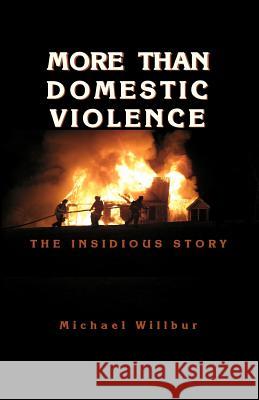More than Domestic Violence: The Insidious Story » książka
More than Domestic Violence: The Insidious Story
ISBN-13: 9781480280564 / Angielski / Miękka / 2012 / 368 str.
-I have learned two lessons in my life: First, there are no sufficient literary, psychological, or historical answers to human tragedy, only moral ones. Second, just as despair can come to one another only from other human beings, hope, too, can be given to one only by other human beings. -Elie Wiesel Mr. Wiesel's quote from his book -All Rivers Run to the Sea: Memoirs- is a testament to this book. Mr. Wiesel describes the abhorrent and mind shattering events he endured as a survivor of the Nazi concentration camps. He speaks not only to his experiences, but also to those of his family, faith, and community. In Mr. Wiesel's book, he describes the events leading up to his realization that although the most painful experiences can be inflicted on us by others, we have the ability to find hope in our personal lives and the world we live in. This takes a monumental amount of courage and the desire to benefit others from our own painful experiences. Mr. Willbur has done just that in this book. As a Certified Trauma Services Specialist, I have worked with hundreds of trauma survivors who have suffered at the hands of others. The trauma may be due to combat, sexual, psychological or physical abuse, but however it is defined it comes down to unexplainable behaviors that destroy the lives of others; often, those closest to them as in the case of domestic or intimate violence. The author has written a poignant and candid story of his personal first hand account of the pain and suffering inflicted not only on the victims of domestic violence, but the impact and destruction of families and in part their community. Lives are destroyed, family member's lives are changed forever and the community is left to deal with the aftermath of said violence. The author has given the reader a broad and informative narrative of his personal experience. What makes this book ultimately notable from other stories is the painstaking work done to explain to the reader how domestic violence impacts all of us not only from a personal view point, but how the media and legal system play an intricate part in how it plays out in the community. Mr. Willbur and I are colleagues working with trauma survivors in a similar arena. Mr. Willbur is uniquely qualified to write this book. He and his spouse Ki have experienced the ultimate pain in the loss of their five grandchildren to domestic violence. Mr. Willbur has taken his personal tragedy and completed a work accomplishing what we are all commissioned to do -make something good of what pain has been inflicted upon us-. In doing so, Mr. Willbur has given us a guide book into the inexplicable behaviors and thought processing of a domestic violence perpetrator. He has also given us an invaluable overview of the cultural, legal and media induced influence into these cases. In his generosity and keeping with the theme of healing, Mr. Willbur has spoken to the desperately needed help the perpetrator requires so as to promote their healing, but also the desire to stop this cycle before the destruction of the abuse escalates. This book should be the one that is frayed and well used in all domestic violence centers and well read by law enforcement and those involved in the legal system. Sarah J. Getman MA, CTSS, LMHC, NCC Certified Trauma Services Specialist











